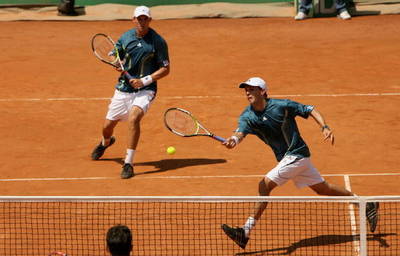The breakthrough isn't far away

When will be the breakthrough? Or as I heard in my youth so much. When will you "make it"? When will we see you at Wimbledon? The onlookers mean well by talking about Wimbledon, but the poor child knows well enough that to play at Wimbledon is his dream, and he frustratingly also knows that he is miles and miles away. All the Wimbledon goading ends up being a sort of empty small talk.

The strange thing is, that many young tennis players don't experience a breakthrough of sorts. For our child prodigy, he made his the first time he stepped on the court. He felt at home. He understood what he had to do, and his acceptance into the tennis world was in fact no real event. Being a prodigy is difficult for this very reason. He doesn't go through the hard-earned steps that other mortals do. He doesn't feel the levels, and that day when he has definitely "arrived" at a new level.
Then, at some point, he'll go into another layer of competition, get a nasty shock, realise he's not the superstar that everyone in his home town has made him out to be, and suddently he must make a decision - are you going to work to get up into the next level, or are you going to be happy being king in your home town? The second option is tempting. The first requires real decison-making and commitment, I'd argue a state that only a parent can deliver. Only they know how much time and money and shredded nerves they are ready to invest to break the next level. The conflict comes when the parent believes this level is achieveable, possibly with back-up from coaches, but the child himself may not be mentally ready to fight for a level. He's never had to do it before.

For the mortal tennis player, playing tennis requires, from day one, making breakthroughs. It may take you a whole season to win your first match, or two seasons to be able to hit crosscourts securely, or three seasons to never miss a passing shot. The list of things to achieve seems endless, but the non-prodigy has an advantage. He has had to fight for his levels from day one, and with every level he gets a new boost, a motivation to kick onto the next one. These players can be counted on to have no real motivation problems, probably for as long as they live. The game was always hard, will always remain hard, but there is still great satisfaction to be achieved nevertheless.
There is a hitch to all of this. I belong to the non-prodigy category. In fact I look at prodigies with complete admiration, because their ease in learning the game is so so far removed from anything that I've experienced.

The hitch is the breakthrough itself. Who sets it? What is it? When will it happen? How will you recognise it when it comes? How will you react when you get there? It is a long list of unknowns - such a long list that you could be daunted if you thought too much. I encourage my players to goal set, but not to worry, at all, about any breakthrough. It is such an uncomprehendable concept, that it is even dangerous for those accompanying the child to broach the subject. The child may develop strange ideas about making a breakthrough in a fixed time, and that any breakthrough will pretty much guarantee that Wimbledon place. It just isn't as simple as that. You can argue all you like that tennis is a simple game, but it isn't, even for the prodigies.
I prefer being a non-prodigy who has to achieve any breakthrough through immense effort, sometimes when I am even too old to really appreciate it fully.
I remember one of the first players I saw down at the club when I was eighteeen. He had that old-fashioned simple technique, a straight-forward shoulder turn and a little push on the ball, and by playing delicately with his racket face angles could produce slight undercut, or a flicked wrist topspin imperceptibly. His miracle shot was his flat ball. He never hit it hard. It came out of his normal backswing, so you couldn't see it coming in his body action, his preparation. Instead of under or top spin, the ball would come out, effortlessly, flat. The ball cracked off his racket, and your feet didn't react. The surprise was perfect.
However, this player was a prodigy. He obviously did win some matches, doubles or singles. And he always had plenty watching him when he practised. He was a joy to watch. I didn't realise it at the time, but he was one of those prodigies who decided to be king at his local club, than go for any breakthrough furhter from home. He never won any big matches in any tournament of significance. But as a child he was special. He had done all of this automatically, with the minimal of effort from the coach.

A coach must talk about these level changes though to his player. He mustn't be afraid to tell his player, "I believe you've made a breakthrough. I can see it and feel it. You are not the same player you were a month ago."
As a coach these level changes I find easy to detect. I look at a player, in practice or in matchplay, and I see something else. It's new.The worst thing for a coach to admit is that he cannot actually plan this level change, he may not have been working specifically on it. It's mostly a chance thing.

I saw my wife make a level change this last summer. She is a middle-aged woman, with no great tennis pretensions or history, but I have always liked playing with her because she is technically good, she tries hard, and she's, on the court, good at following instructions.

This summer I entered her into a big doubles tournament outside our region, where she'd have to play with an unknown partner, in unfamiliar surroundings, and where many seasoned match players, of much higher rankings, would take part. A recipe for disaster.
I watched the first match from high up over her court. It didn't look good. The opponents had slightly better rankings than my wife and her partner, but in fact they BOTH had false rankings - two players who'd masses of experience, and just simply didn't defend their ranking points anywhere.
The match started badly. My wife was anxiously trying to show the other three players that she played with a great coach, and she knew how to play tennis. But she was anxious. She was not timing the ball well, and missing easy shots.

At around about 1-4 down, a change happened. My wife calmed down, stopped trying to win the match, and just hit her balls as if she was playing with me, as if the balls were always going to come back, so she too must just keep in the zone, and keep also getting her balls back. She relayed this calmness to her partner, reassuring her to do her best at getting everything back, and not to worry if a couple of points were lost. All in one, my wife played the coach, and the player. Her decision-making became sharp, and in the space they managed to turn the game around, and eventually win it. The opponents knew that they had lost to a fine player, but one who had no track record like they had, no experience, no proof of achievement in matchplay.
My wife came off the court thrilled. I knew that she had made a breakthrough. But did she? She was indeed behaving as if she'd seen a revelation from an angel, but effectively she did not recognise a breakthrough. She just did on the match court what she had been trained to do on the practice court. And it was wonderfully perfect. For her it was normal. For me it was a breakthrough.
Have A Great Story About This Topic?
Do you have a great story about this? Share it!
Touring Pro tennis
from
workouttennis.com



